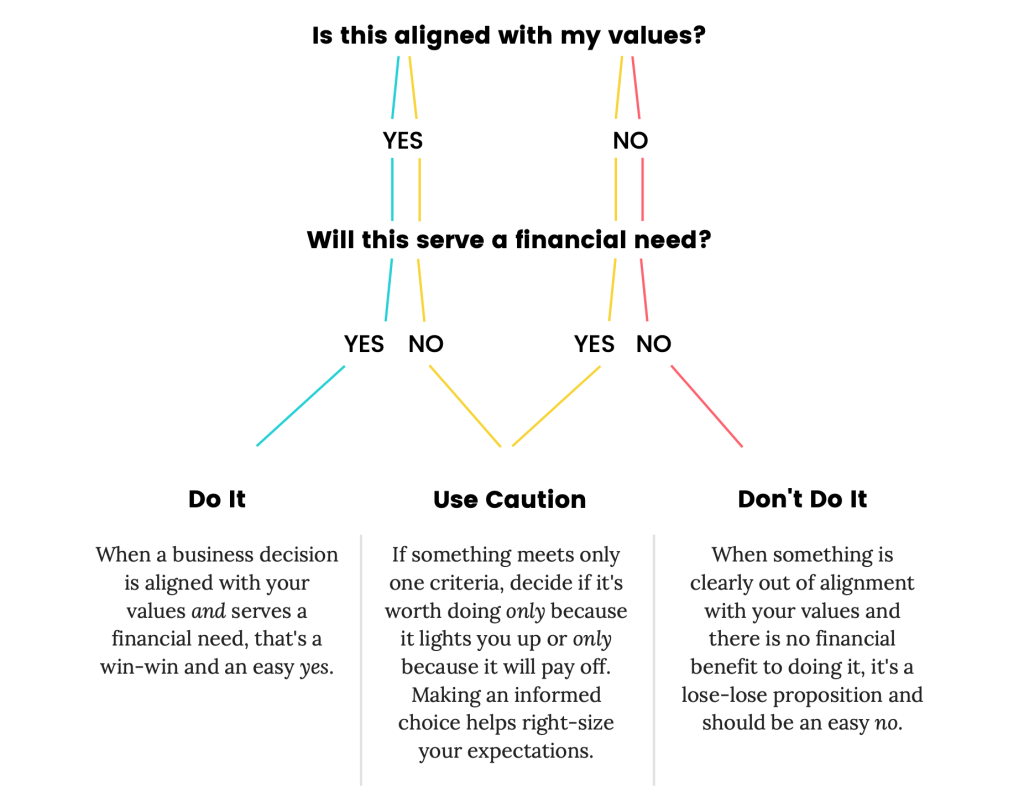Identifying Core Values
The Ultimate Guide for Feminist Founders
You probably have a sense of your core values (or guiding principles). This guide will walk you through how to make them meaningful and a driving force for your company.
By Becky Mollenkamp, PCC
Values are a hot topic in the business world, especially among feminist entrepreneurs. But too often, a company’s “values” amount to little more than a few positive words on a website (if they even get that far).
In fact, core values can serve as a North Star for your business, guiding every decision to generate results aligned with your life’s mission of creating an equitable world. To do that, however, you’ll need to do more in-depth work than just picking random words from a list.
To truly be a values-led entrepreneur, you need to identify what matters most to you, encapsulate those principles into a few meaningful words, and then develop a system for using those beliefs to inform your choices.
Here’s a step-by-step guide to values for feminist entrepreneurs.
What are my core values?
Values are complex and highly individual, but you’d be forgiven for thinking they are as simple as words that inspire you.
Unfortunately, like so many things in capitalism, values are often simplified and commoditized. That results in “values-led” being little more than a meaningless buzzword.
It’s only with introspection and commitment that core values go from pithy terms to powerful tools.
Core values are the fundamental beliefs that guide your life and work. They communicate what’s most important to you, what brings meaning to your life. These deeply held beliefs shape the way you see the world and interact with others.
Your values may have inspired your career, who you serve, or how you deliver your work. They may be what drove you to entrepreneurship. And you can harness them more formally to help you strategically grow your business.
Successful business owners use their values to shape their product and service offerings, govern their marketing and sales tactics, guide their company culture, inform financial decisions, and more.
Personal values vs company values
When digging into this work, entrepreneurs often wonder whether there should be a distinction between their personal values and their company’s values.
Large corporations typically outline a set of company values independent from what the various executives or board members believe.
Feminist businesses understand that to be truly purpose-driven, everyone involved in the organization should share a set of values that align with the company’s mission.
Solopreneurs or small business owners can certainly draft company values based on their own personal principles. At this point, your business is an extension of you and should reflect what you stand for. As you grow, you’ll hire people who share the existing values.
If your business has already grown to include a leadership team, the feminist approach is to collectively craft a set of values. Results that vary too much from your personal values may be a sign of values misalignment and reflect a need for personnel changes.
Why core values are important
Values aren’t important if they are only words on your website. When put to practical use, however, they can be transformative. Here are four ways core values are important for your business.
1. They can serve as a compass to guide decision-making. When faced with tough choices, it’s easy to wind up doing what you think you should based on external pressure. Clear values can help you stay on a path toward what matters most to you.
2. They can establish a strong brand identity. Standing for something, and being unafraid to talk about it, sets you apart. Values-driven messaging attracts customers who are passionate about the same beliefs, and can accelerate trust and loyalty.
3. They can shape company culture. Hiring based on values ensures a strong foundation. A shared understanding of what matters most creates passion and motivation. Plus, returning to a set point of agreement can help during moments of conflict or crisis.
4. They can increase employee retention. A positive company culture—one that feels like a true community—increases employee productivity and engagement, and leads to higher retention rates. That benefits people and profits (rather than focusing only on the bottomline).
How to identify your core values
If meaningful core values are more than just words you pull from a list, what are they? How do you choose values that feel right, but are also going to serve your business? Follow this process:
REFLECT: The most important part of identifying your values is knowing yourself. Spend time thinking about what motivates and excites you. Be really honest with yourself. Forget what you think your values should be, and determine what truly matters to you.
Here are some questions you can ask yourself to help identify your core values:
1. What experiences have been most meaningful to you?
2. What drives you to take action or pursue a particular goal?
3. What gets you onto your soapbox?
4. What change do you want to see in the world?
5. What do you want to be remembered for?
6. What are the qualities you admire most in others?
7. What sorts of activities get you into “flow” state?
8. What are your top priorities in life?
9. What do you believe is right and wrong?
10. What are you willing to stand up for, even if it goes against popular opinion?
11. How do you hope people describe you behind your back?
12. What do you want to achieve with your business?
As an intersectional feminist, you’ll also want to consider what values you’ve internalized from the dominant culture. What are the things that you have been taught to value? How did privilege or marginalization shape your values? How might your beliefs uphold power dynamics? How do you want to challenge systems of oppression?
BRAINSTORM: Once you have a clear picture of your motivation and purpose, brainstorm words that help encapsulate that vision.
Values are often things like respect, responsibility, courage, kindness, creativity, or innovation. Feminist business owners may also focus on words like equity, inclusion, justice, or liberation.
There are no rules! It’s important to choose values that are meaningful and authentic to you and your business. Your values may be individual words, but they could also be longer phrases or even images.
Write down everything that comes to mind, without worrying about if they are perfect or how many you have.
REFINE: Once you have a long list of values, prioritize them in order of importance. Which feel most essential? Which would you never compromise on? Are there any at the bottom of the list that can be eliminated?
Also, look for words/phrases that can be grouped. Are there synonyms, words that complement each other, or values that are in service of one another.
For example, you may decide that caring and empathy mean the same basic thing to you. Or that joy, happiness, and fun all feel the same in your body. Or perhaps you’ll realize that equity and rest are included within the overarching idea of liberation.
It may be helpful to write a brief description of each value to explain what it looks like in action.
Continue prioritizing, combining, and deleting until the words or phrases that remain each feel equally important and non-negotiable.
TEST: Test your core values against your decision-making process. Do these words/phrases accurately guide your choices in a way that will allow you to stay true to your principles? You’ll find a personal core values exercise below that can help in this assessment.
Note: Core values aren’t set in stone! This process isn’t about coming to a perfect set of values that will forever dictate your life and business. As you grow and change, your values can change—that’s normal and absolutely fine.
How to use your values in business
Once you’ve identified your core values, it’s important to live them out in your business (otherwise they are meaningless).
Walking your talk with values looks like regularly talking about them with your employees, customers, and other stakeholders. This ensures that everyone is on the same page, working toward the same vision for the future.
Done correctly, your team should know what your company stands for, be able to clearly communicate that with others, and know how to use those values to guide their work choices.
Every decision, big or small, should consider your values. What choice would support or contradict your principles? Taking action in alignment with your values reduces regret and resentment.
If a decision isn’t reflective of your core values, proceed with caution. Are there changes you can make to get into alignment with your values? If not, evaluate whether it is really necessary and, if so, prepare yourself to feel frustrated or worse about the experience and/or outcome.
Personal core values exercise
Create a decision-making framework that is based on your core values. This will help you make decisions that are consistent with your values.
This can look different for every business, but generally it helps to create a decision matrix or decision ladder that takes values into account.
For example, I evaluate business choices based on values alignment and financial need. For every new offer, client, marketing tactic, etc., I ask myself two questions:
1. Is this decision aligned with my values?
2. Does it serve a financial need (ie, does it make or save money or time)?
If the answer is yes to both, then I can feel confident I am making a sound decision that I am very unlikely to later regret.
If the answer is no to both, then I almost always make a different decision. I know that these cases rarely deliver satisfying results.
And if the answer is one yes and one know, I take more time to reflect on how necessary or important it feels to move forward. These are the types of choices that may cause problems if I’m not careful.

While I evaluate based on values and finances, other entrepreneurs may choose different variables to consider (like work-life harmony, time, energy, etc.).
A values-based decision framework helps feminist business owners be more intentional in the decisions they make for themselves and their companies. No matter what decision you ultimately make, you’ll go into it with eyes wide open and with realistic expectations.
Final thought
Don’t let values become a buzzword in your business. Take time to make them meaningful and then put them to work in your business every day. And at least once a year, reflect on what’s important to you and tweak your values as needed.
This intentional approach will allow you to make meaningful choices that help you stand out, stand up for what’s right, and leave a legacy for which you can be proud.



